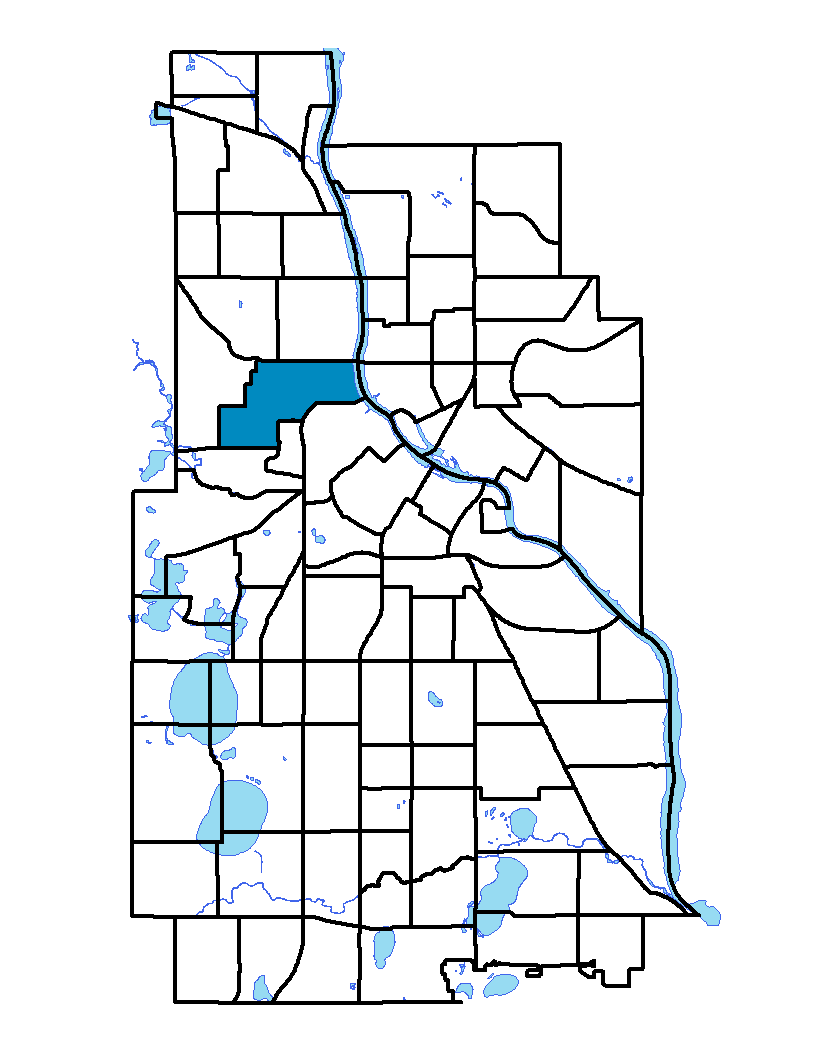The Near North neighborhood is located in the northwest portion of the City of Minneapolis and north of downtown, hence its name. It stretches from the Mississippi River on the east to Penn, Knox, James and Irving avenues on the west, and from West Broadway Avenue on the north to Olson Memorial Highway and 11th Avenue North on the south. Sumner Community Library has been a significant architectural and cultural landmark since it first opened to the public Dec. 16, 1915. A Carnegie library, the Tudor Revival-style building has historic designation nationally and locally – on the National Register of Historic Places and with the Minneapolis Heritage Preservation Commission. The library was named after Charles Sumner, a U.S. senator from Massachusetts and an outspoken abolitionist. In January 2005 the library celebrated a grand reopening after a two-year renovation project.
To learn more about the neighborhood association visit: www.nrrc.org
Indicator Details
|
Indicators |
Primary Domain | Indicator Value | Rank | Tier |
|---|---|---|---|---|
| Walkability | Neighborhood Characteristics | 61 | 49 | Middle |
| Voter Participation | Social Cohesion | 20.2% | 58 | Middle |
| Violent Crime | Health Systems and Public Safety | 115.3 | 79 | Bottom |
| Vacancy Rates | Housing | 11.8% | 68 | Bottom |
| Tree Cover | Natural Areas | 26.1% | 65 | Bottom |
| Travel Time to Work | Employment Opportunities | 23.3 minutes | 60 | Bottom |
| Transit Accessibility | Transportation | 514.9 | 12 | Top |
| Toxic Releases from Facilities | Environmental Hazards | 31.1% | 57 | Middle |
| School Readiness Scores | Educational Opportunities | -% | - | Data N/A |
| School Proximity to Traffic | Environmental Hazards | 0.0% | 1 | Top |
| Residential Proximity to Traffic | Environmental Hazards | 11.8% | 47 | Middle |
| Residential Mobility | Social Cohesion | 74.6% | 58 | Middle |
| Reading Proficiency | Educational Opportunities | 18.7% | 23 | Top |
| Public Assisted Households | Employment Opportunities | 78.1% | 83 | Bottom |
| Proximity to Superfund Sites | Environmental Hazards | 49.6% | 62 | Bottom |
| Proximity to Brownfield Sites | Environmental Hazards | 19.3% | 70 | Bottom |
| Preventable Hospitalizations | Health Systems and Public Safety | 14.5 | 80 | Bottom |
| Preschool Enrollment | Educational Opportunities | 23.8% | 75 | Bottom |
| Pedestrian Connectivity | Transportation | 111.7 | 59 | Bottom |
| Offsite Alcohol Outlets | Neighborhood Characteristics | 1.7 | 55 | Middle |
| Motor Vehicle Collisions | Health Systems and Public Safety | 144.2 | 85 | Bottom |
| Low Birth Weight | Health Systems and Public Safety | 10.1% | 60 | Bottom |
| Long-Term Unemployment | Employment Opportunities | 14.1% | 86 | Bottom |
| Local Business Vitality | Economic Health | 45.1% | 72 | Bottom |
| Household Transportation Costs | Transportation | 16.2% | 34 | Middle |
| High School Graduation Rate | Educational Opportunities | 39.0% | 6 | Top |
| Food Desert | Neighborhood Characteristics | 66.7% | 27 | Top |
| Excessive Housing Cost Burden | Housing | 46.0% | 78 | Bottom |
| Employment Rate | Employment Opportunities | 46.9% | 80 | Bottom |
| Commute Mode Share | Transportation | 37.3% | 23 | Top |
| Chronic School Absence | Health Systems and Public Safety | -% | - | Data N/A |
| Business Retention | Economic Health | -2.2% | 76 | Bottom |
| Blood Lead Levels in Children | Housing | 5.8% | 58 | Middle |
| Age of Housing | Housing | 64.6% | 12 | Top |
| Adult Educational Attainment | Educational Opportunities | 72.7% | 78 | Bottom |
| Access to Parks and Open Space | Natural Areas | 3.0% | 62 | Bottom |
| Access to Mainstream Financial Services | Economic Health | 49.8% | 81 | Bottom |

